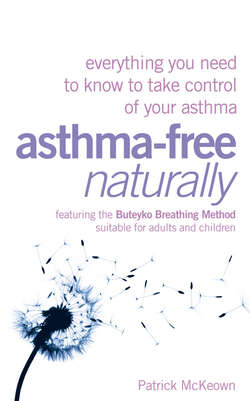Читать книгу Asthma-Free Naturally: Everything you need to know about taking control of your asthma - Patrick McKeown - Страница 13
What is overbreathing?
ОглавлениеFirst, let’s take a quick look at what overbreathing is, and why we do it in the first place. Clinically, overbreathing is known as hyperventilation; put simply, it means breathing more air than the body needs. The standard volume of normal breathing for a healthy adult is three to six litres of air per minute. Scientific research conducted by Professor Buteyko over three decades, along with scientific trials at the Mater Hospital in Brisbane in 1995 demonstrated that people with asthma breathe a volume of ten to twenty litres per minute between attacks, and over twenty litres during an attack.
Overbreathing causes a loss of carbon dioxide from the lungs. This is not a problem if it occurs only for a short time, because breathing will reduce afterwards to restore the carbon dioxide levels. However, breathing more air than we need over a period of time – and time can mean hours, weeks, months or even years – will result in the day-to-day levels of carbon dioxide remaining low constantly. Our respiratory centre becomes accustomed to or fixed at these lower levels of carbon dioxide and determine them to be ‘correct’. Our respiratory centre will therefore instruct us to overbreathe to maintain these low levels of carbon dioxide even though the rest of our bodily organs and tissues are suffering.
Carbon dioxide is very important for normal bodily functioning (for a more detailed explanation, see Appendix 1), it is logical to assume that the body must have some way to prevent losing it. Narrowing of the airways is caused by inflammation, by constriction of smooth muscle and by increased mucus secretion, and is a natural defence mechanism to help maintain the carbon dioxide level. In a person with asthma, this defence mechanism activates when the carbon dioxide level declines too much. Overbreathing also causes cooling and drying of the airways, two effects that have been recognised to play a role in producing asthma symptoms (for a more detailed explanation, see Appendix 2).
People with asthma are better off than anyone else who overbreathes because they are equipped with an instant defence mechanism to prevent the loss of carbon dioxide. People who do not have this defence mechanism suffer from many of the diseases of civilisation for which there is no cure.
It is worth noting that before 1900, people who had asthma often lived longer than the rest of the population and that death from asthma was unknown. ‘Having asthma generally meant having a long life free from many diseases, but nobody could explain why asthma prevented other diseases or why asthmatics lived longer than other people,’ Professor Buteyko noted. At the end of 19th century, Professor of Medicine at Oxford University Sir William Osler, wrote in his Principles and Practice of Medicine textbook: ‘We have no knowledge of the morbid anatomy of true asthma. Death during the attack is unknown.’
Overbreathing resulting from modern living is the cause of breathing-related diseases. Hyperventilation is not just a result of asthma, hyperventilation is the main contributor of asthma.
Professor Buteyko believes that genetic predisposition determines which illnesses people develop from overbreathing. As a result, each person who hyperventilates or overbreathes is affected individually, based on hereditary factors.
